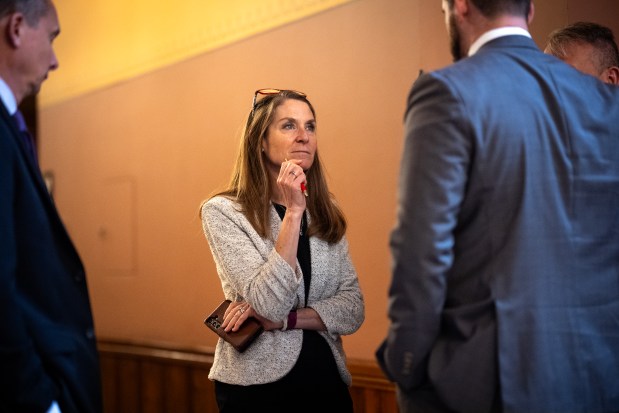District U-46 School Board members Monday approved the purchase of cyber liability insurance policy and discussed the purchase of ChatGPT Edu, an AI product that would be used by teachers, coaches and administrators.
The $118,283 insurance policy with Tokio Marine HCC would run from July 1 through June 30, 2026, and comes with a $3 million limit and a $100,000 deductible, according to documents provided for the meeting.
“U-46’s decision to purchase a cybersecurity insurance policy was driven by the growing frequency and sophistication of cyber threats targeting school districts nationwide,” Deputy Superintendent of Instruction Lela Majstorovic said prior to the meeting.
It’s become necessary, Majstorovic said, because as student and staff data systems become more interconnected, the potential financial and operational risks from a cyber incident have increased significantly.
Meeting documents said that “since 2023, 108 ransomware attacks have impacted over 1,800 schools nationwide. … According to Alliant Insurance Services, the district’s insurance broker, the average ransom demand in 2024 was approximately $847,000.”
“While the district has very strong, state of the art preventive measures in place,” Majstorovic said, “insurance offers added reassurance in managing unforeseen events. Purchasing a cybersecurity insurance policy adds a critical layer of financial protection and support in the event of an attack.”
At Monday’s meeting, Majstorovic and Rola Tarek Mohamed, a research and project management fellow, also continued a board discussion about whether to spend $432,000 for 4,000 educator ChatGPT Edu licenses with Open AI for the 2025-26 school year.
The system will allow educators “to use AI as a planning assistant, research partner and support tool,” Mohamed said at the meeting. The deal would include staff training on how to use the technology.
ChatGPT Edu could allow users to write an email that ensures “it’s appropriate to the intended audience,” upload curriculum frameworks to create specific tasks, and check that lesson plans align with board-adopted curriculum, among other things, Majstorovic said.
“Any teacher is expected to do this level of planning on an every-single-day basis,” she said. “Using a tool like this could really help with navigating that planning.”
Time currently be used for such work can free teachers up to do other things, such as thinking about how they are giving kids that “in-the-moment feedback so that they can continue to learn,” Majstorovic said.
Mohamed told the board that related AI guidelines prohibit sharing any personal data or using it for grading.
Board member Dawn Martin said she wasn’t convinced the technology would be completely beneficial.
“I have a lot of concerns with this, the ethics, the integrity behind AI, the ability of it to take away critical thought, especially if we start rolling it out for students,” she said. “Just because something exists doesn’t mean embracing it is fully the way (to go).”
U-46 Superintendent Suzanne Johnson said, “I think we find ourselves in this really interesting place where we have to start to determine what are the guardrails that we can identify and create, how do we support professional learning, how do we start to do some of that — if it’s sooner than later — as it’s preparation for this thing that now exists.”
Any proposal won’t be back for discussion for at least five weeks, Johnson said, so there’s time for more board input and feedback.
Mike Danahey is a freelance reporter for The Courier-News.



